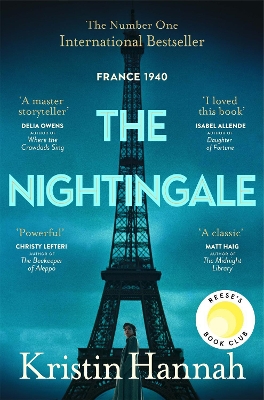Reviewed by violetpeanut on
The two main characters, Vianne and Isabelle are perfect foils for each other. Vianne is the steady, responsible woman who wants only to keep her head down and protect her family. Isabelle is the younger impetuous sister who wants to be a part of the resistance no matter what kind of danger that puts her in. Isabelle thinks that her rebellion is worth the risk while Vianne is unwilling to step out of line for fear of bringing harm to her daughter. Vianne has a very quiet strength while Isabelle is outspoken. In the beginning of the book is seems that Isabelle is the stronger and braver woman for her willingness to confront danger for the the greater good. However, as the book progresses, we see the strength and bravery that it took for Vianne to live in an occupied village and the strength of will it took to keep her family safe. These characters were beautifully complex and I loved them both.
The scenery is described in amazing detail, from the actual buildings and countryside, to the overall mood of the people. As the book starts you get a clear picture of cheerful French countryside and village life as well as city life in Paris but as the book progresses, the countryside changes as bombs are dropped, neighbors are rounded up and paranoia sets in. The descriptions of settings really help to set the mood in a subtle way and the reader begins to feel the danger, devastation and fear that the villagers feel.
WWII is an era in history that I've learned about in history class and seen in the movies. I've heard about courageous men and the women who held the fort at home. I've heard about bombings and food shortages, ration cards and Rosie the Riveter. I've learned about the atrocities and the concentration camps. But everything I've learned has had a decidedly "American" slant to it. That is, being a U.S. citizen, almost all of the info I know about WWII is about our side of the story. I knew that other countries were occupied, but I knew next to nothing about what that actually meant. I knew that areas were bombed, but I knew next to nothing about how those areas would look. I never gave a second thought to the RAF pilots who were shot down in Nazi occupied areas and what would happen to them. I never knew that Nazi soldiers took up residence in French households. I knew that Jews were rounded up and shipped off to concentration camps, but I never knew how that was actually accomplished. I think as Americans, we are taught a very slanted view of history. A very self-centered version that revolves around us instead of around global issues. That's really a disservice to our children. But that's a topic for another day. Suffice it to say, The Nightingale opened my eyes to another facet of this time in history and it was absolutely riveting.
This book shines a light on the lives of women living in Nazi occupied France. I was completely oblivious to the subtle courage it took just to live. I was oblivious to the acts of bravery performed by women of the resistance. Kristin Hannah has written a real masterpiece that will teach you something while weaving a tale that is heartbreaking and gritty and poignant and beautiful and ultimately uplifting.
We Remain.
Reading updates
- Started reading
- 25 January, 2015: Finished reading
- 25 January, 2015: Reviewed
